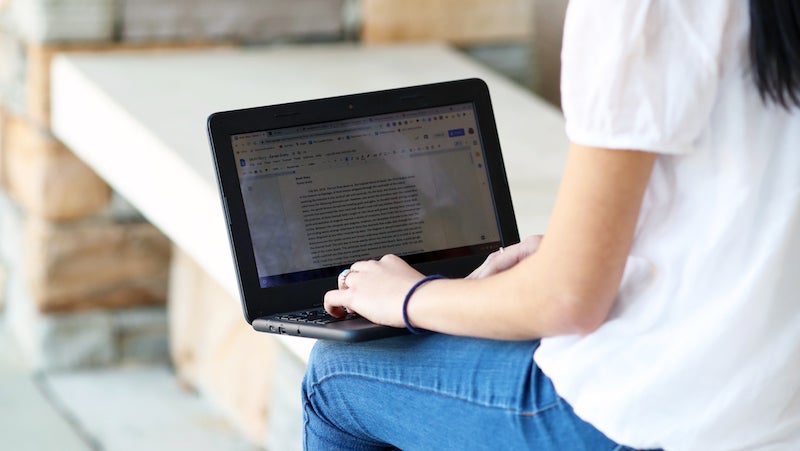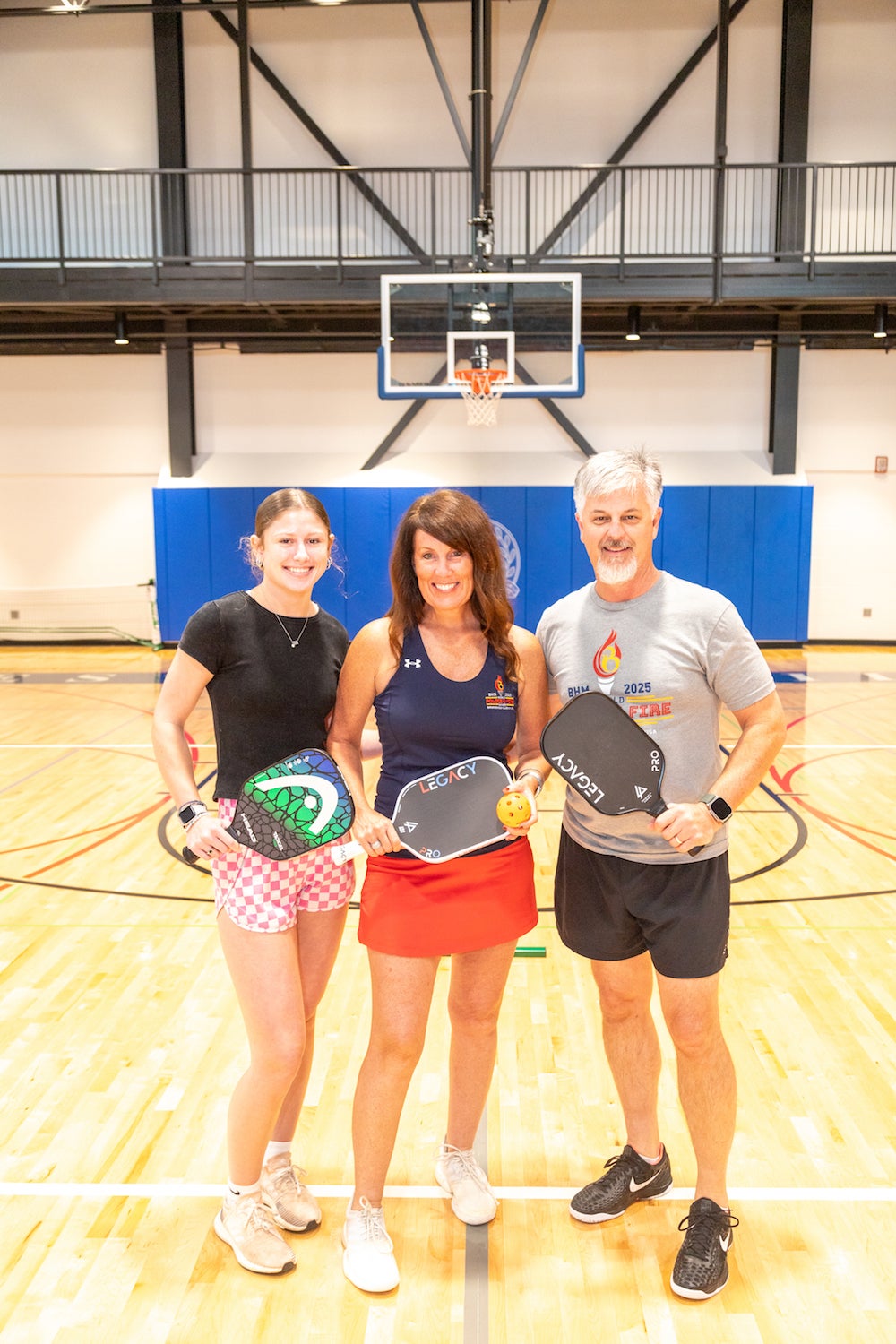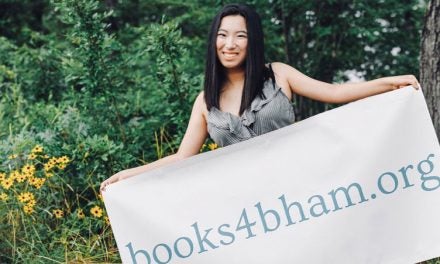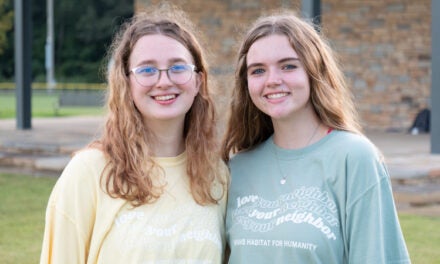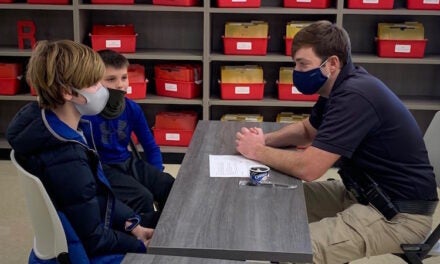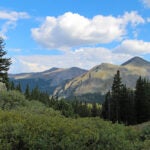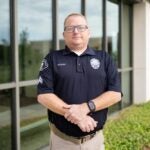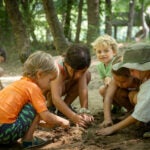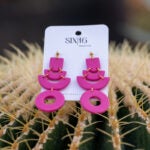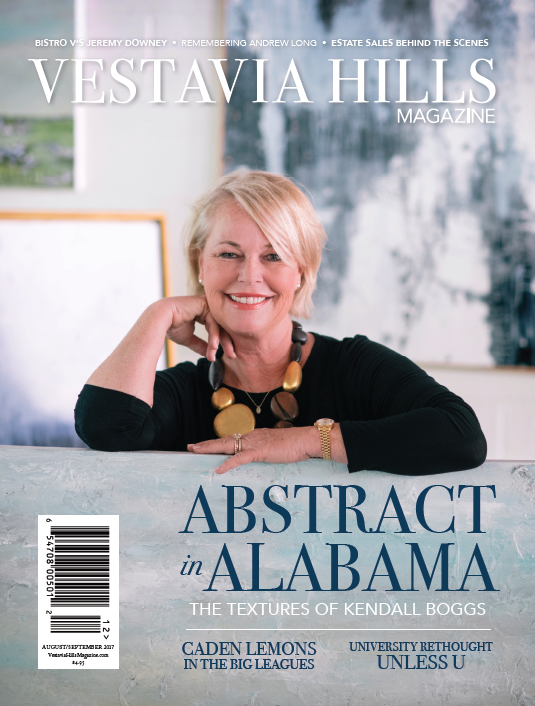Essays Contributed
Photos by Morgan Hunt
Each school year Michael Sinnott’s AP English Language & Composition students learn to vulnerably speak from scars one step out of their comfort zone. As they write their own memoir stories in the style of The Moth Radio Hour, they share their most authentic selves through stories of tragedy, of struggles, of the mundane seen through a literary lens. And through these stories they come to see one another in new light, especially in a pandemic season of extra isolation. Here are three of them.
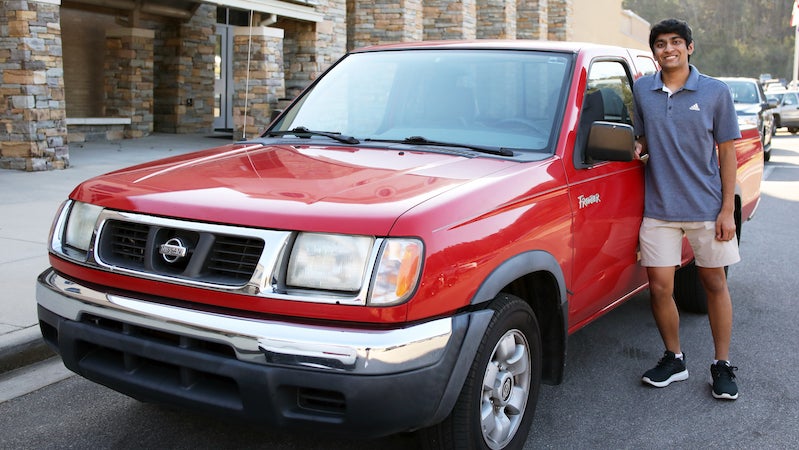 A Car That Can Go
A Car That Can Go
By Savan Patel
Many kids my age ask for and receive brand new 4Runners, Silverados or F-150s. In my case, neither thing happened. I simply said that I wanted something “that was able to go.” And go my used, bright red 1999 Nissan Frontier pickup could. It had poor AC and heating, dim headlights and hand-crank windows. It needed some repairs, had no aux cord and needed Bluetooth cassette to play music.
But it wasn’t just used, it was used by my grandfather.
After my grandfather passed away in the spring of 2019, the end of my freshman year, my family was visiting his house and my grandmother in Nashville. While there, my aunt said, “Savan, pick heads or tails.” “What? Ah, tails,” I replied. After all, tails never fails. My aunt flipped a quarter and then opened her palm slowly, revealing the gleaming silver feathers of a bald eagle. It was tails. “Congratulations,” my aunt said. “You just won a car.”
A coin flip had decided the new owner of my grandfather’s truck. I was neither excited nor disappointed, but I was pleased. After all, I said I just wanted something “that could go.” However, over time, to me it became more than just that.
My grandfather was born in India, and he moved to Kenya in his early childhood. In Kenya, finding stable food every day was a struggle. He had no bed to call his own. Against the odds, he managed to make it to England as a young adult. There, he became a double-decker bus driver. He drove red double-decker buses, I should add. He started a family, and then finally risked everything to move to America, where he again took a large risk and opened a motel in Cave City, Kentucky. He never stopped working. Even on the day before he passed, he drove the little red truck to Walmart, where he worked after selling his motels. He did not need the money. His children had grown up to be successful, and they could have provided. But, despite that, he continued to work. And now, this second red vehicle of his was mine.
To me, this truck is the physical embodiment of my grandfather’s work. His hard work allows me to go to restaurants while he had to search for food on his own in Kenya. His hard work allows me to get an education while he received little. I realized last year that I cannot waste his efforts. He truly wanted his children and grandchildren to succeed and be happy. I had to recognize that goal. It now rests in my mind whenever I drive anywhere. When I drive to school, it is to work hard to receive an education and be successful. When I pick up my sister from soccer practice, it is to do a favor for my parents and help them be happier and less stressed. When I go to the gym, it is to stay healthy so I can continue to do the aforementioned things. His hard work both physically enables and emotionally inspires me to work hard, and the truck is what brings me to have that view. Something that can do that, I believe, is not just some vehicle “that can go.”
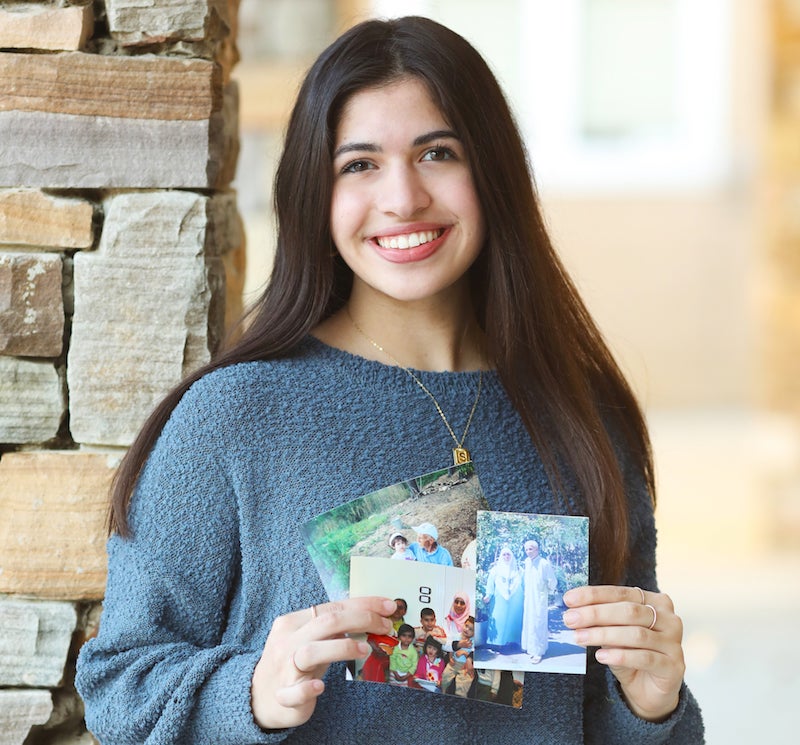 Thicker Than Water
Thicker Than Water
By Serene Almehmi
When I was 7 years old, I was impressively bilingual. I flipped from English to Arabic without stumbling, without stuttering, without pausing for long minutes to remember a word. I went to Syria for the entirety of every summer since I was born. I attended school with my cousins, played soccer in the streets of Aleppo and rode Sea-Doos in the Dead Sea. My aunts, uncles and cousins were not extended family; they were just family. Arabic was not a second language, just another one. I did not struggle—it was second nature.
But then the Syrian Civil War began in 2011, and I didn’t visit that year. Then the next. Then all the years to follow.
My Arabic dwindled away. I did not call my aunts, uncles or cousins. By 2018, I even forgot most of their names. My father showed me pictures often: dozens of children that looked much like me, newly scattered across Europe, displaced by the war. That year, we planned a five-week trip to visit my 30 or so cousins and all my aunts and uncles in a complex of lake houses outside of Stockholm, Sweden.
When we arrived at the lake, my brother and I smiled, muttered our best conversational Arabic, then stared blankly at our cousins. In the seven years we had not seen each other, the seven years they fled war, the seven years my brother and I spent forgetting the war in Tennessee, we had become complete strangers.
We did not have something essential in common: language. We tried playing soccer in the field nearby and then card games, but explaining the rules proved too challenging. We swapped broken English and Arabic, relearning each others’ ages and grades and interests. But, still, a day later, we could barely speak to each other.
On the second day, after dinner, my cousins Taha and Bushra asked my brother and me to take a rowboat out on the lake. It was a massive lake. Sweden, even in the summer, is incredibly cold. We started to shiver, the sun started to set, and we decided to turn back. We grew too tired to paddle. My brother suggested that he try swimming back to get help, and he, always overly-confident, dove into the cold water. He got about 20 feet ahead of us before he started gasping for air.
My brother has pretty bad asthma. He used to get pneumonia so bad he’d go to the hospital for a day or two at least once a year. I did not know how to say “asthma” or “pneumonia” or even “he can’t breathe” in Arabic. But Bushra and Taha understood enough to panic. We rowed as fast as we could. I jumped in the lake and yanked him out of the water.
My brother sat in the rowboat, shaking. Bushra and Taha wrapped him in their dry clothes. We tried our best to paddle back. Taha and I even made haphazard attempts to swim and drag the rowboat. After almost an hour and a half of this, we made it to the shore. No one was waiting for us.
Before we could even call my dad to get my brother an inhaler or a nebulizer, the four of us laid down in the grass and laughed. We looked at our bruised feet and pruned fingers and red faces and laughed as hard as we could, until our stomachs hurt.
In that moment, we didn’t have words in common, not even full sentences. But we were family, I realized, and family surmounts language, overcomes boundaries. Family is bigger than language, than conversation. Blood is thicker than water, thicker than cold water in Sweden.
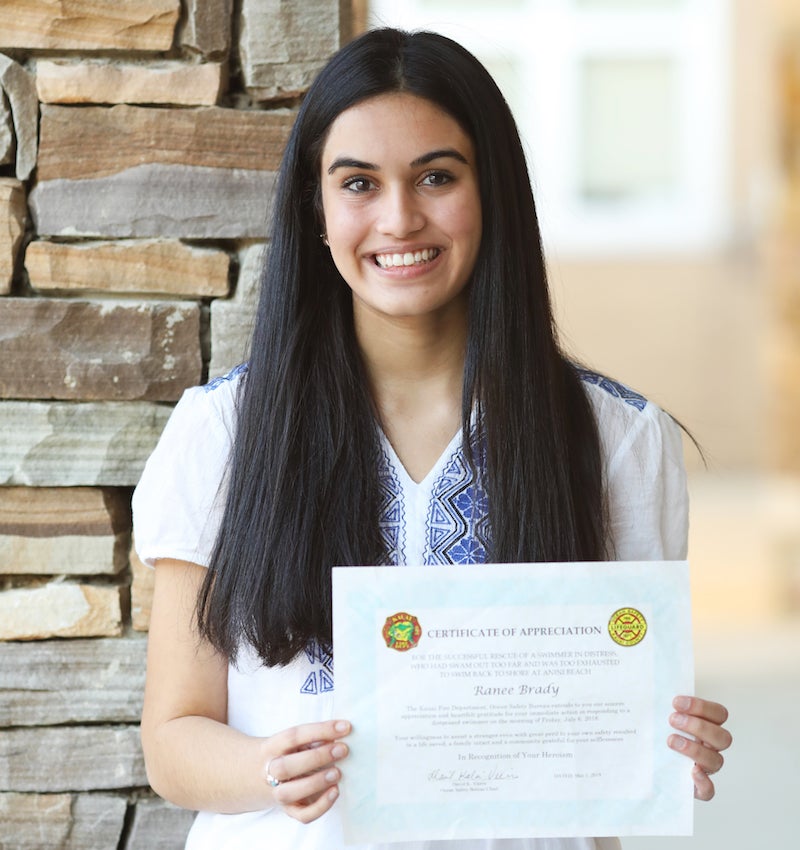 The Rescue
The Rescue
By Ranee Brady
The sun beat down on the tropical Island of Kauai, the third largest island in the Hawaiian archipelago. A fresh breeze whipped through the north side of the Island, swathing the beaches in the scent of salt and coconuts. On the land, this breeze was a welcome relief from the blistering afternoon sun. However, just across the shoreline, over the crystal blue water, the gentle breeze turned into howling gusts and gales, its fiendish hands stirring vengeful currents that pummeled the stoic coral reef.
Kauai’s coral reef was Mother Nature’s Great Wall, the protector of three football field’s length of calm blues and greens. Between the tide pools and seagrass, however, deceptive channels in the reef snake slyly through the calm water, disguised as any other meandering wave.
The disguise is almost impeccable, and the only distinctions are the riptide current and vicious undertow, nearly unnoticeable until you are in the channel itself. A quick Google search could tell you that 11 people have drowned at this particular beach, Anini Beach, since 1970. On July 6, 2018, I kept that number from reaching 12.
Peering through my cloudy snorkel mask, I watched the spectacle that ensued in the coral reef right below me. Sardines darted in schools across the sand, their reflective scales greeting me. Crabs and other burying critters dug for refuge as my ominous shadow shrouded their homes. I gave a quick kick of my leg and push of my arm to avoid being swept down shore by the soft current.
Later, my dad and I re-entered the water one more time before we left. The right of the beach was different than the vibrant scenes I had spectated earlier. Instead of coral, dark seagrass covered the bottom, reaching up to us with its sinister tendrils. I could tell my dad was unimpressed with the scenery as well, and we decided to swim farther out. The seagrasses gave way to the fringe of the coral reef that protected the cove, the tumultuous waves still very many yards away. My dad, already hesitant about how far we were from the beach, signaled for me not to go any further, and after minutes of silently observing the teeming life, we began to head back.
The current seemed to have picked up with the afternoon wind. Just as we came back over the seagrass, I heard a woman’s voice calling for help and swam over to her flailing figure. She grasped for my arm, and I managed to keep her afloat.
Frantic, I asked if she was okay, even though in her obvious state, she was not. She only sputtered water and laid her head back, now floating on the surface with the help of my arm. The water around me was moving significantly faster than the water I had snorkeled in and was swiftly vacuuming us out to sea. I strapped my snorkel mask back on, fastened my grip on the woman, and swam as fast as I could for shore.
I managed to break through the faster current, a channel, though I did not know it at the time, and pushed onward. Although I was facing the shore, the current managed to push us west, so I was swimming diagonally and not making much headway. There were many moments on my trek that I thought I was going to drown with her, and I considered giving up and hoping someone would find us downstream.
Saltwater had now filled my goggles, and I closed my eyes, swimming blindly in the same direction. My snorkel tube fell out of my mouth countless times, resulting in mouthfuls of saltwater. After what seemed like forever, I had to stop. Planning on having to tread water, I dropped my lead-filled legs vertically and was surprised when they hit the sanded bottom. I lifted my head above the water for the first time since I first began swimming with the woman and ripped off my mask.
When the paramedic boat reached us, a first responder jumped in to take the woman’s subconscious form from my hands. I watched in a haze as she was strapped on an inflatable stretcher and hoisted on the boat.
Back on the beach the reality of what I had just done set it with fatigue. After lots of water and rest, I got to my feet as a middle-aged man approached us. He introduced himself as Jack, the woman’s son, and thanked me repeatedly.
After a long conversation regarding each of our stays on the island, a figure cocooned in a towel approached our huddle. She was helped along by first responders but shook them off, pushed through her family members, and enveloped me in a hug. She thanked me through the warm embrace, and I heard the woman’s voice of whom I saved for the first time. Whatever gratefulness that was not conveyed in her touch was expressed by her eyes, which were brimming with tears. I will remember the gratifying gaze of her wise, watery eyes for the rest of my life.

